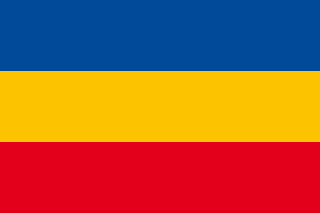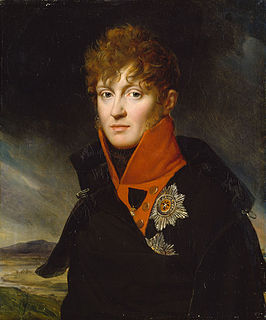This page is based on this
Wikipedia article Text is available under the
CC BY-SA 4.0 license; additional terms may apply.
Images, videos and audio are available under their respective licenses.

Mecklenburg is a historical region in northern Germany comprising the western and larger part of the federal-state Mecklenburg-Vorpommern. The largest cities of the region are Rostock, Schwerin, Neubrandenburg, Wismar and Güstrow.

The Duchy of Mecklenburg-Strelitz was a duchy in northern Germany, consisting of the eastern fifth of the historic Mecklenburg region, roughly corresponding with the present-day Mecklenburg-Strelitz district, and the western exclave of the former bishopric of Ratzeburg in modern Schleswig-Holstein. At the time of its establishment, the duchy bordered on the territory of Swedish Pomerania in the north and of Brandenburg in the south.
A grand duchy is a country or territory whose official head of state or ruler is a monarch bearing the title of grand duke or grand duchess.

The states of the German Confederation were those member states that from 20 June 1815 were part of the German Confederation, which lasted, with some changes in the member states, until 24 August 1866, under the presidency of the Austrian imperial House of Habsburg, which was represented by an Austrian presidential envoy to the Federal diet in Frankfurt.

One of the functions of the North German Confederation was to handle the mail and issue postage stamps, which it began doing, by means of the North German Postal Union (Norddeutscher Postbezirk), on 1 January 1868.

Dargun is a town in the Mecklenburgische Seenplatte district, in Mecklenburg-Western Pomerania, Germany. It is situated 12 km (7 mi) km west of Demmin. It is famous for Dargun Palace, a former Cistercian abbey.

Grabow is a town in the Ludwigslust-Parchim district, in Mecklenburg-Western Pomerania, Germany. It is situated on the river Elde, 7 km (4.35 mi) southeast of Ludwigslust, and 34 km (21.12 mi) northwest of Wittenberge. It is twinned with Whitstable, in Kent.

The Grand Duchy of Mecklenburg-Strelitz was a territory in Northern Germany, held by the younger line of the House of Mecklenburg residing in Neustrelitz. Like the neighbouring Grand Duchy of Mecklenburg-Schwerin, it was a sovereign member state of the German Confederation and became a federated state of the North German Confederation and finally of the German Empire upon the unification of 1871. After World War I and the German Revolution of 1918–19 it was succeeded by the Free State of Mecklenburg-Strelitz.

By the Hamburg Agreement on March 8, 1701, Mecklenburg was separated into two duchies with limited autonomy, which formed a collective state–as of 1815, the Grand Duchies of Mecklenburg-Schwerin and Mecklenburg-Strelitz. Since 1755, they had the same constitution and were under the control of the same parliament. In 1815, both parts became Grand Duchies by the Congress of Vienna.

The Grand Duchy of Mecklenburg Friedrich-Franz Railway was the state railway company in Mecklenburg-Schwerin and Mecklenburg-Strelitz. After its second nationalisation in 1890 up to the merger of the Länderbahnen into the Deutsche Reichsbahn in 1920 it was under the direction of the Grand Duchy's Executive Railway Board in Schwerin.

Frederick Louis of Mecklenburg-Schwerin was a hereditary prince of the Grand Duchy of Mecklenburg-Schwerin, one of the constituent states of the German Confederation. He was the son of Frederick Francis I, Grand Duke of Mecklenburg-Schwerin, and of Princess Louise of Saxe-Gotha-Altenburg.

The German Empire consisted originally of 26, and later 25 constituent states and an Imperial Territory, the largest of which was Prussia. These states, or Staaten each had votes in the Bundesrat, which gave them representation at a federal level.
Mecklenburg-Strelitz may refer to:
The North German Confederation Treaty was the treaty between the Kingdom of Prussia and other northern and central German states that initially created the North German Confederation, which was the forerunner to the German Empire. This treaty, and others that followed in September and October, are often described as the August treaties, although not all of them were concluded in August 1866.











